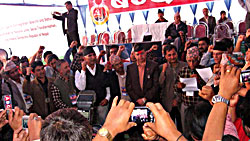 MUKESH POKHREL |
Chairman Jhal Nath Khanal leads the Communist Party of Nepal-Unified Marxist Leninist which, despite its outdated name, is closer to being a moderate social democratic force. JN now has the challenge of preventing the UML from being subsumed by the gravitational pull of the larger Unified Communist Party of Nepal-Maoist.
For this, the UML will have to stick to its unique selling point, the one thing that distinguishes it from the Maoists: its rejection of violence as a political weapon. By putting up the Youth Force and competing with the Maoists in the use of threats and extortion, the UML has been trying to emulate more radical comrades. That policy is a deadend.
JN's party started out in Jhapa in the 1960s by beheading landlords. It spread its influence among the urban bourgeoisie with the tacit support of the autocratic Panchayat regime that found a willing collaborators against the Kangres. It boycott the 1981 referendum, allowing the Panchayat to win.
In 1990, Ganesh Man Singh used his moral force to create a coalition of disparate communist groups as a unified challenge to the Panchayat. The People's Movement I created what is now the UML, and got its 'People's Multi-party Democracy' ideological bearing from the short-lived stewardship of Madan Bhandari and Jibraj Ashrit. Together they transformed a rotting revolutionary group into a formidable electoral machine.
Both these leaders died in a tragic highway accident in 1993, and the baton was passed on to Madhab Nepal who ran the party without taking any risks of ideological innovation or organisational reform. His distaste for change drove UML cadre into the arms of the Maoists.
Chairman JN now has to prove he will not play second fiddle to the more powerful chairman of a much more radical communist party. He would have to draw the support of an increasingly rightwing NC and keep the faith of Madhes-based parties for a national coalition. He must not lose sight of the goal: writing an acceptable constitution by April next year.
JN may yet prove himself to be the leader the UML has always needed, but his test has barely begun. It must start with an unambiguous enunciation of the one thing that distinguishes his party from the Maoists: the belief in the politics of non-violence.


